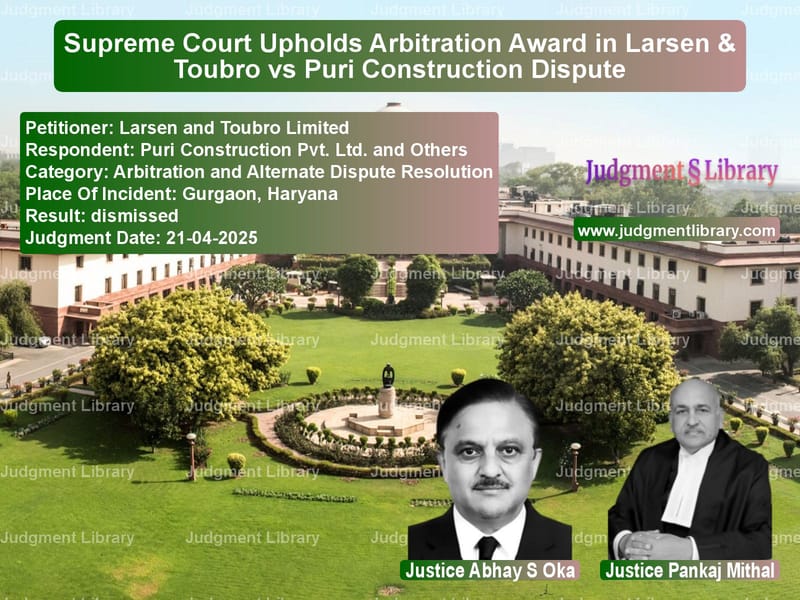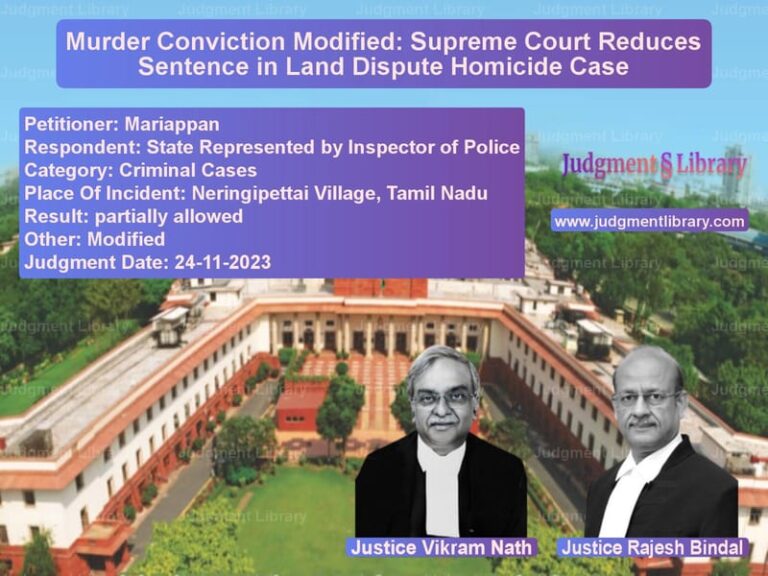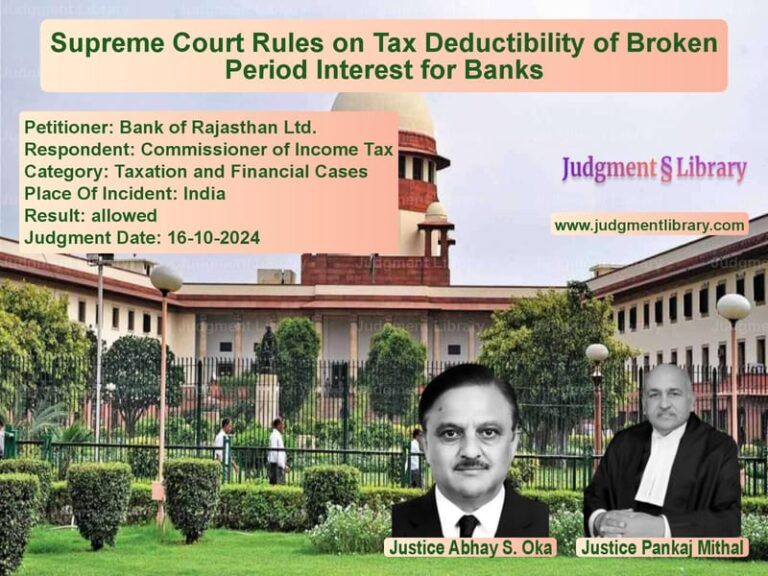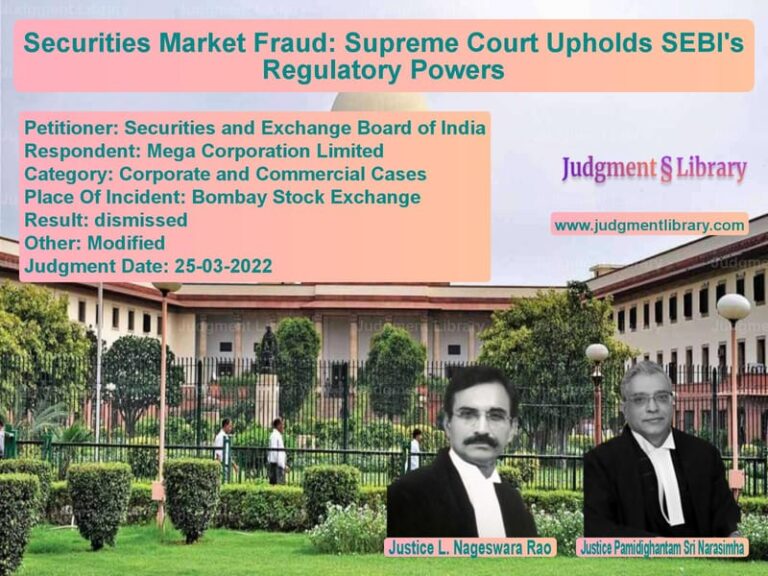Supreme Court Upholds Arbitration Award in Larsen & Toubro vs Puri Construction Dispute
The Supreme Court of India recently delivered a significant judgment in the case of Larsen and Toubro Limited versus Puri Construction Pvt. Ltd. and Others, which revolved around a complex dispute arising from a land development agreement and subsequent arbitration proceedings. The case highlights critical aspects of arbitration law, contractual obligations, and the limited scope of judicial interference in arbitral awards under the Arbitration and Conciliation Act, 1996.
The dispute originated from a Development Agreement dated 10th March 1998 between Larsen and Toubro Limited (L&T) and Puri Construction Limited (PCL) for the development of lands in Gurgaon, Haryana. The agreement stipulated that L&T would develop the property at its own cost, with the developed property to be divided in a 25:75 ratio between PCL and L&T, respectively. The agreement also included obligations for L&T to pay External Development Charges (EDC) and complete construction within a specified timeframe.
Due to adverse market conditions, the parties entered into a Supplementary Agreement on 30th December 1999, followed by a Tripartite Agreement on 10th January 2000 involving Lord Krishna Bank. These agreements aimed to address financial challenges and modify certain terms of the original Development Agreement. However, PCL terminated the Development Agreement on 18th December 2000, citing L&T’s failure to fulfill its obligations, including non-payment of EDC and abandonment of the project.
The dispute was referred to arbitration, and the Arbitral Tribunal delivered its award on 28th December 2002. The Tribunal found that L&T had committed fundamental breaches of the Development Agreement, including non-payment of EDC and abandonment of the project. It also held that the Supplementary Agreement was vitiated by economic duress and was a ‘non-starter.’ The Tribunal awarded damages to PCL and directed L&T to fulfill certain obligations, including payment to the Bank and returning title deeds.
L&T challenged the award under Section 34 of the Arbitration Act before the Delhi High Court, which set aside the award. On appeal, the Division Bench partially upheld the Tribunal’s findings but set aside the quantification of damages. Both parties then approached the Supreme Court.
In its judgment, the Supreme Court emphasized the limited scope of judicial interference in arbitral awards. The Court noted that under Section 34 of the Arbitration Act, courts cannot modify an award but can only set it aside or remand it in specific circumstances. The Court referred to its earlier decision in Project Director, National Highways No. 45 E and 220, National Highways Authority of India v. M. Hakeem and Another, which held that the power to modify an award is not available under Section 34.
The Supreme Court upheld the Division Bench’s findings that the Supplementary Agreement was a non-starter due to L&T’s failure to fulfill conditions precedent. The Court agreed with the Tribunal’s conclusion that the Supplementary Agreement was vitiated by economic duress, as PCL was compelled to enter into it due to L&T’s defaults and financial distress. The Court noted, “The Tribunal looked into various terms and conditions of the Development Agreement and the obligation of L&T to carry out its activities in a time-bound manner. The Tribunal considered the pleadings of PCL and the failure of L&T to deny material paragraphs.”
On the issue of breach, the Supreme Court affirmed the Tribunal’s finding that L&T had fundamentally breached the Development Agreement by failing to pay EDC and abandoning the project. The Court observed, “The Tribunal found that there was no Development work carried out and not a single floor of any residential building was constructed for which development plans were sanctioned. Therefore, the finding recorded by the Tribunal that L&T committed fundamental breaches of the agreement cannot be interfered within the limited jurisdiction under Section 34 of the Arbitration Act.”
However, the Supreme Court agreed with the Division Bench’s decision to set aside the Tribunal’s quantification of damages, noting that the Tribunal had relied on L&T’s counterclaim figures without proper evidence of PCL’s actual loss. The Court stated, “The Division Bench held that instead of basing the findings on the figures set out by L&T in its counter-claim, the correct approach would have been to determine the prevailing market rate for sale of built-up area at the time of the breach and thereupon determine the proceeds that PCL would have received from the sale of its 25 per cent share under the Development Agreement.”
The Supreme Court also addressed the issue of judicial restraint in arbitration matters. The Court expressed concern over lengthy arguments and excessive reliance on case law in arbitration appeals, stating, “In several appeals arising out of Sections 34 and 37 proceedings, we have noticed that there is a tendency on the part of the senior members of the Bar to argue as if these proceedings were regular appeals under Section 96 of the Code of Civil Procedure, 1908.” The Court urged lawyers to exercise restraint and focus on the limited scope of judicial review in arbitration cases.
In conclusion, the Supreme Court dismissed the appeals, upholding the Division Bench’s judgment. The Court clarified that while the findings on breach and validity of the agreements were affirmed, PCL’s remedy for quantification of damages remained open. The Court also directed L&T to comply with the Tribunal’s order regarding costs and the return of title deeds to PCL.
This judgment reinforces the principles of limited judicial interference in arbitral awards and underscores the importance of adhering to contractual obligations. It also serves as a reminder to legal practitioners to respect the streamlined nature of arbitration proceedings and avoid unnecessary prolongation of disputes.
Petitioner Name: Larsen and Toubro Limited.Respondent Name: Puri Construction Pvt. Ltd. and Others.Judgment By: Justice Abhay S Oka, Justice Pankaj Mithal.Place Of Incident: Gurgaon, Haryana.Judgment Date: 21-04-2025.Result: dismissed.
Don’t miss out on the full details! Download the complete judgment in PDF format below and gain valuable insights instantly!
Download Judgment: larsen-and-toubro-li-vs-puri-construction-pv-supreme-court-of-india-judgment-dated-21-04-2025.pdf
Directly Download Judgment: Directly download this Judgment
See all petitions in Arbitration Awards
See all petitions in Commercial Arbitration
See all petitions in Contract Disputes
See all petitions in Judgment by Abhay S. Oka
See all petitions in Judgment by Pankaj Mithal
See all petitions in dismissed
See all petitions in supreme court of India judgments April 2025
See all petitions in 2025 judgments
See all posts in Arbitration and Alternate Dispute Resolution Category
See all allowed petitions in Arbitration and Alternate Dispute Resolution Category
See all Dismissed petitions in Arbitration and Alternate Dispute Resolution Category
See all partially allowed petitions in Arbitration and Alternate Dispute Resolution Category







